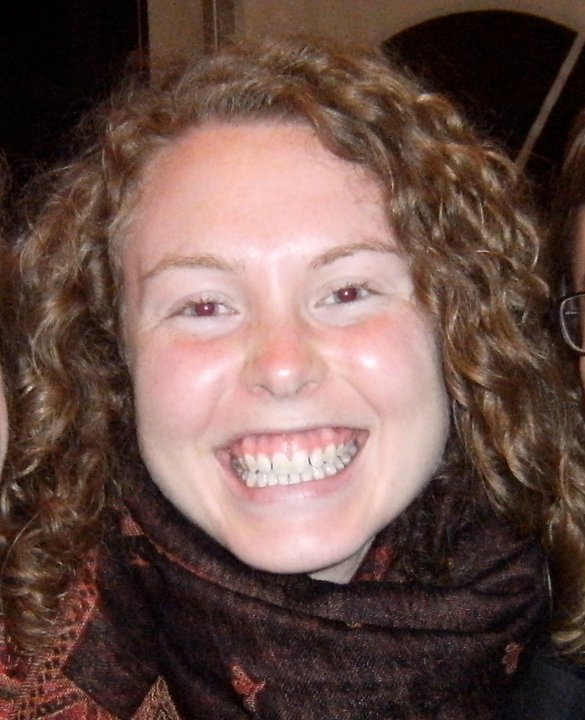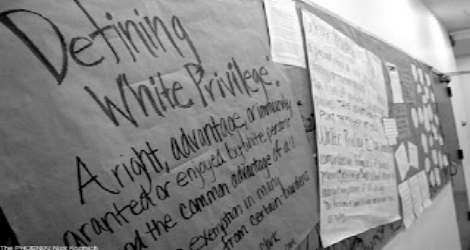A poem, born in post-apartheid South Africa, revived for the global Joining Hands Initiative; a spoken word reflection about white and Global North privilege, driven by Peggy McIntosh’s invisible knapsack metaphor.
By Abbi HeimachSometimes it takes a journey, a journey that shakes-up your worldview so much that there is no turning back. My journey began in many ways with my involvement in the National Network of Presbyterian College Women (NNPCW). Conversations with NNPCW members about race and privilege shook me just enough to compel me to ask some big questions and to make particular choices to grow as a follower of Christ. My big questions included How am I called to live? and How can I stop the cycle of perpetuated oppression? These questions grounded me; and through mentorship and the presence of the Spirit, I felt led to study abroad in South Africa three years ago—which ultimately transformed my worldview and my outlook on life. In observing the heated racial context of post-apartheid South Africa, I witnessed vast social and economic disparities between white and black South Africans. The injustices seemed blatant to my outsider eyes, but it was not until I returned to the U.S. that I realized that, although the American racial context is different, we still have similar inequalities and disparities. It took leaving my context to see my context in a clearer light. Suddenly I realized the presence of my white American privilege in a more powerful way. I felt the heavy weight of my invisible backpack (in the words of Peggy McIntosh’s metaphor), and I was distraught on how to respond.[i]
While I was in South Africa, I made a friend who was involved with a group of mostly Zulu people who wrote and performed pieces of spoken word poetry. Their politically, yet personally heated, messages poured through their souls, and as the only white person in the room, I felt the emotional intensity of their rhythms, rhymes, and realities heightened by race and ethnicity. This intensity and artistic form of expression stayed with me as I returned home, and I wrote a spoken word poem while reflecting upon my whiteness and the question of how to use my privileges.
Since that time in my college life, I continue to unpack my multi-layered privileges and work to use them productively—without unhelpful guilt and paternalism that only perpetuate systems of inequality. My privileges do not mean I know more, they mean that I need to listen more from the margins, learn how I contribute and impact marginal groups, and change my actions to stop the oppressive cycle. Recently I interned in the Presbyterian Hunger Program, researching for its Joining Hands Initiative that mobilizes people in focused campaigns to tackle systemic causes of hunger both in the United States and abroad. There, I learned about international trade policies (particularly policies created in the U.S. and enforced by those in the Global North) that pave the way for some multinational corporations to exploit the people and land of a plethora of countries in the Global South. Now I can no longer thoughtlessly buy a bundle of Dole bananas without acknowledging how Dole’s subsidiary, Plantations du Haut, grabbed fertile land in Cameroon and is destroying the local banana economy, practically enslaving local workers, and contributing to mass poverty. Now I can no longer—to the best of my ability—buy and eat genetically modified organism (GMO) food products when corporations such as Monsanto patent living organisms, disrupt food economies, and hurt the environment.[ii] Now I can no longer sit back and play ignorant to the U.S. government’s role in the Trans-Pacific Partnership that will likely give multinational corporations sweeping rights—as other Free Trade Agreements (FTA’s)—over people and even governments. Yet without transparency, the specifics of our government’s agreements are unclear.[iii]
So what’s next? How will I choose to live with the knowledge I now have? What choices does God call me to make? The answers are not simple, but while reflecting on my experiences in the Presbyterian Hunger Program, I adapted my original spoken word poem, entitled My Invisible Backpack, to fit my reactions to my Global North privilege in the context of our globalized world, and the dire need for us to move into action—challenging the social realities that give some groups more power than others and hopefully energizing those who might not have considered their privileges before now. I had the opportunity to share my poem at the Presbyterian Hunger Program’s conference Together for Justice after presenting some of the work of Joining Hands with PHP staff Valery Nodem and Alexa Smith. Above is a video of my performance (by Andrew Kang-Bartlett), and below, the text of the poem.
My Invisible Backpack
As I turn around, do you see anything on my back?
If you don’t see a thing, maybe there’s something you need to unpack
Look, I’ve got this nice backpack and it’s carrying nice things
It helps me hide in a comfortable world, and it gives me longer wings
Food I consume without thought, clothing that crosses overseas
It makes life somewhat easy, with opportunities to be
But not all my fellow neighbors, brothers, sisters, and friends
Have this nice big ol’ backpack, and it’s not something I can lend
You see invisible is this bag, when it brings me to the top
Of a life I didn’t choose, and I’m telling you, it’s time to talk
Now that I’m seeing that it’s here, I’m really feelin’ the weight
Not knowing how to lighten the pack, or how to make it break
Get it off of me, it’s not at all fair
Will it ever come off, so that I may share?
If you’re from the Global North like me, you’ve got one too
It’s not easy to see, but it’s something we must do
Thanks to Peggy McIntosh, the Hunger Program, and friends
They helped me find where I was blind
And now it all depends
On what I do now, that’s why I’m sharing with you
Something I didn’t realize, but now I have a clue
There’s so much more to learn, and experiences to hear
This is just one step, of my unpacking to get near
A more just world, with equality and love
No more hatred, no more violence
You know, a dove
A symbol of peace, let me speak clear
We’re each part of this system
Every one of my peers
So come on, try and see, what’s uncomfortable and true
Look at your invisible backpack, it’s something we have to do.
Notes
[i] McIntosh, Peggy. White Privilege: Unpacking the Invisible Knapsack. Accessed September 5, 2012 http://ted.coe.wayne.edu/ele3600/mcintosh.html.
[ii] Knezevic, Irena. “Monsanto Rules: Science, Government, and Seeds Monopoly.” Politics and Culture. Accessed September 5, 2012 http://www.politicsandculture.org/2010/10/27/monsanto-rules-science-government-and-seed-monopoly/.
[iii] “The Office of Public Witness Action Alert.” The Presbyterian Mission Agency. Accessed September 5, 2012 http://capwiz.com/pcusa/issues/alert/?alertid=61460306.
 Abbi Heimach is a 2011 graduate of the College of Wooster—where she studied Women’s, Gender, and Sexuality Studies and Religious Studies. During the 2011-2012 academic year she was in Nashville, TN teaching special education at a public Montessori elementary school. Afterwards she completed an internship with the Presbyterian Hunger Program, and now works in the Young Adult Catalyst office and the Presbyterian Peacemaking Program in the Presbyterian Mission Agency.
Abbi Heimach is a 2011 graduate of the College of Wooster—where she studied Women’s, Gender, and Sexuality Studies and Religious Studies. During the 2011-2012 academic year she was in Nashville, TN teaching special education at a public Montessori elementary school. Afterwards she completed an internship with the Presbyterian Hunger Program, and now works in the Young Adult Catalyst office and the Presbyterian Peacemaking Program in the Presbyterian Mission Agency.










I am always grateful for the opportunity to learn something new; especially when I consider it enlightening. I experienced both while attending the Together for Justice conference in Chicago where Abbi Heimach shared her poem, “My Invisible Backpack” in response to Peggy McIntosh’s “White Privilege: Unpacking the Invisible Knapsack.”
What I learned was something about Abbi. I learned that she is courageous because it took courage for her to admit and to point out the privileges and opportunities she has a result of her social location. She was courageous because she challenged other people with the same privileges to accept the fact that they have an invisible backpack too. I learned from Abbi about her understanding that these privileges are not transferable or available to everyone.
I was enlightened by Abbi’s poem. I was enlightened because of her acknowledging that there’s something she has learned and can do to unpack her invisible backpack. I was enlightened because I perceived in her recitation, Abbi’s sincerity and a genuine request for forgiveness to those of us who don’t have, wear a backpack, or reap the benefits of having one.
Thank you, Abbi. For seeing how the invisible can be help others to see the good in all God’s people.
Greetings,
In South Africa, the so-called post-apartheid system/era was built on the foundations of the same old racially based evil political system. The political transition only changed the roof, but left the walls, windows and worse, the foundation still intact. Yet, the world decided to create icons out of the situation; hence Nobel Peace Prizes were awarded to some people for their role in a “peaceful transition”. How peaceful was it? Was it peaceful because it was not to the anticipated scale or between anticipated groups? It is not a surprise that they are losing their ‘icon’ statuses among many people in South Africa. This is of course only in comparison to the number that existed during the ‘90’s.
The majority of the indigenous Afrikan (since “Alkebulan” was deleted and silenced) population bear the harsh realities of the legacy of apartheid. There are many unanswered questions about the political state of affairs in South Africa. A peaceful political transition is as sad as an insulting joke. Most of the times, lies can be so true and beautiful to simple, gullible or distant eyes.
The questions will always linger, who is to be held accountable for apartheid? Is it the foot soldiers, those who gave orders, or those who maintained the system through tax and uphold its evils laws? There was the Truth and Reconciliation Commission that made a joke of the sufferings of Afrikans. I work with communities from townships, informal settlements and rural areas, so suffering, poverty, anger and confusion I witness it on daily basis.
What is sad about all of this is that there are opportunist that are starting to capitalize on the prevalent anger, frustrations, and suffering of the people. There are people who now bringing out all the dirt that was swept under the capert during the political transition. There are people propagating hatred through a diluted and untrue form of Biko’s Black Consciousness.
It is not all doom and gloom. There are beautiful souls across all races. There are people who are really trying to working towards uniting people. Unity that is needed is not just between races, but it is also between genders, sexes, religions, and all ethinic groups. There are people making
Poetry and Spoken word are very beautiful and powerful medium of expression. Poetry has always been a force fighting against very powerful negatives forces. White Privilage is an international trend. No over knows it better than Afrikans, Aborigines, Native Americans and Andamanese (among others). The Global north will always making money at the expense of the South or Black and Brown people. Maybe and also few soldiers from the North.
I wish the idea and concept of an Invisible backpack can be as international as Coca Cola or Google, but can that happen? Can that be allowed to happen? People that hold the power to change things are the everday people, but they have been made powerless.
May power and peace be with the people that know that they hold the power and are using their power.